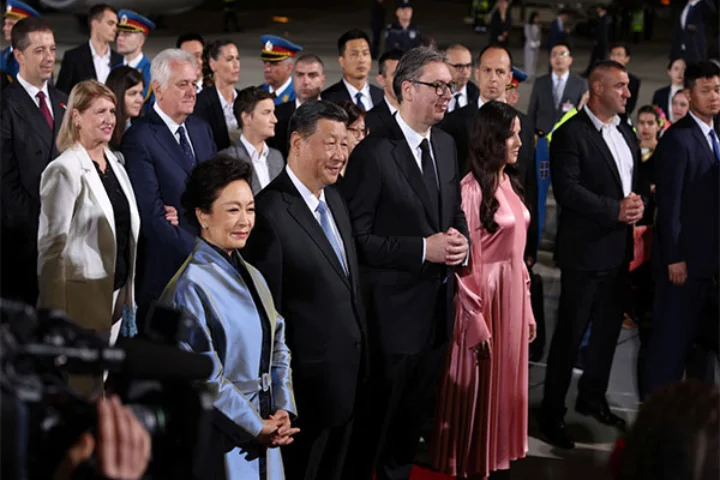

Chinese President Xi Jinping arrives in Serbia (Image Credit: Reuters)
Analysts have said that Chinese President Xi Jinping’s visit to Serbia and Hungary demonstrates China’s limitations amid the ups and downs in ties between Beijing and the European Union, VOA News reported.
Xi Jinping, accompanied by his wife, Peng Liyuan, arrived in Belgrade on Tuesday to pay a state visit to Serbia. Xi and his wife arrived in Serbia after concluding his visit to France.
Serbian President Aleksandar Vucic and his wife, Tamara Vucic, welcomed Xi Jinping at Belgrade Nikola Tesla Airport. Children welcomed Xi and his wife, Peng Liyuan by presenting them with flowers and waving the national flags of China and Serbia.
Xi arrived in Serbia to mark the 25th anniversary of the NATO bombing of the Chinese Embassy in Belgrade in 1999. The US has apologised for what it called a “mistaken” bombing that killed three Chinese nationals and injured 20 others. Xi is expected to pay tribute to those killed at the site, which is now a Chinese cultural centre.
During his visit to France, French President Emmanuel Macron pressed Xi Jinping on Russia’s military action in Ukraine, trade disputes and human rights. Notably, Xi is on a six-day visit to Europe and after his Serbia visit, he will head to Hungary.
Speaking to VOA News, Francesco Sisci, an Italian sinologist, said that it appears that China is facing difficulties in its relations with European nations.
Sisci said, “It’s interesting that … China didn’t manage to secure more significant countries for Xi’s visit to Europe. It seems that China is having greater difficulties in its ties with European countries, and it has good ties with two governments that have also good ties with Moscow. That is — Europe is moving faster away from China as it sees it too close to Moscow.”
Serbia and Hungary have developed close ties with Russia and China under Serbian President Aleksandar Vucic and Hungarian Prime Minister Viktor Orban. China has been investing billions in various projects, including electric vehicles, railways, and factories, in Serbia and Hungary.
Ja Ian Chong, associate professor of political science at the National University of Singapore, said that Xi will try to stress China’s role in supporting stability.
“Xi will probably try to stress the PRC’s [People’s Republic of China] role in supporting stability and maybe suggest but not openly accuse the United States of being destabilizing and unnecessarily aggressive,” VOA News quoted Ja Ian Chong as saying.
The two nations like China have spoken against sanctions by the US and EU on Russia over its military action in Ukraine, which began in 2022, although Hungary has voted in favour of them.
Orban, despite leading a nation that is both a North Atlantic Treaty Organization (NATO) and EU member, has friendly ties with Russian President Vladimir Putin and held talks with him on the sidelines of the Belt and Road International Cooperation Summit Forum held in Beijing in October.
Unlike other EU members, Hungary continues to purchase the majority of its fuel from Russia. Serbia is a candidate to join the European Union. Viktor Orban is the only leader who attended the Summit and met Xi Jinping.
Dragana Mitrovic, a political science professor at the University of Belgrade, said those ties have triggered tensions with Hungary’s partners in the West.
Mitrovic said, “In this moment of tense geopolitical competition and measuring economic and overall cooperation by strategic gains and losses, Hungary will continue to be under pressure from Brussels and Washington when pursuing cooperation with China,” VOA News reported.
Upon arriving in Serbia, Xi in a written statement stated, “China and Serbia enjoy profound traditional friendship. Our bilateral relationship has stood the test of changing international environment and become a fine example of state-to-state relations,” Xinhua reported.
Xi said he looks forward to taking this visit as an opportunity to hold talks with Aleksandar Vuvic on bilateral ties and other issues of mutual interest, renewing friendship, planning for cooperation, exploring development, and creating a new blueprint for the development of bilateral relations.
He said, “I am confident that this visit will be a fruitful one and will open up a new chapter in China-Serbia relations.” Xi Jinping arrived in Serbia at the invitation of Serbian President Aleksandar Vucic.
The International Atomic Energy Agency (IAEA) has confirmed that two Iranian centrifuge production facilities, TESA…
The human rights department of the Baloch National Movement (BNM), Paank, has strongly condemned the…
In a major boost to India's coastal defence capabilities, the Indian Navy on Wednesday commissioned…
Volker Turk, the UN High Commissioner for Human Rights, on June 17 expressed concern over…
Prime Minister Narendra Modi addressed the G7 Outreach Session on the theme 'Energy Security: diversification,…
Prime Minister Narendra Modi held a telephonic conversation with US President Donald Trump on the…